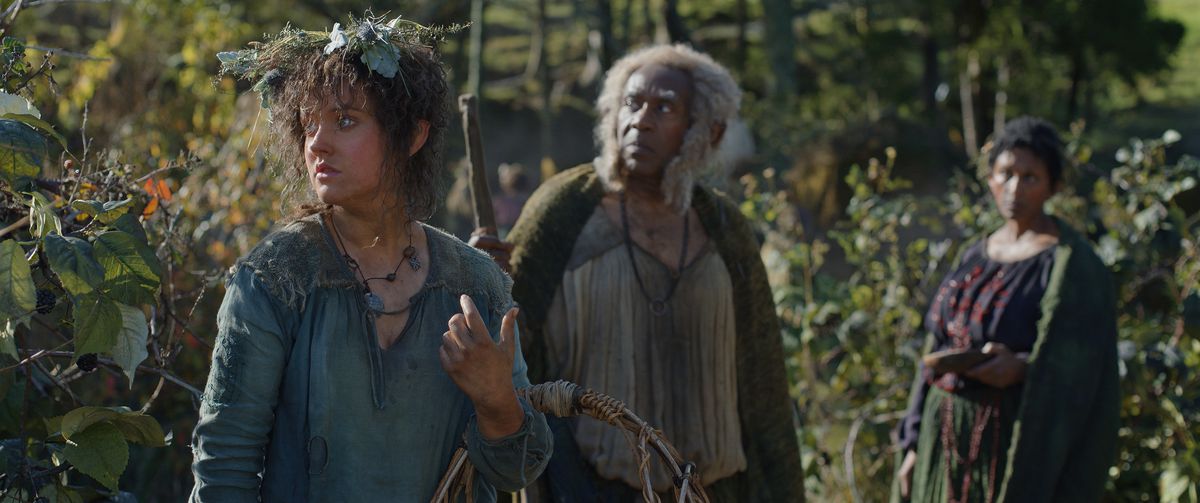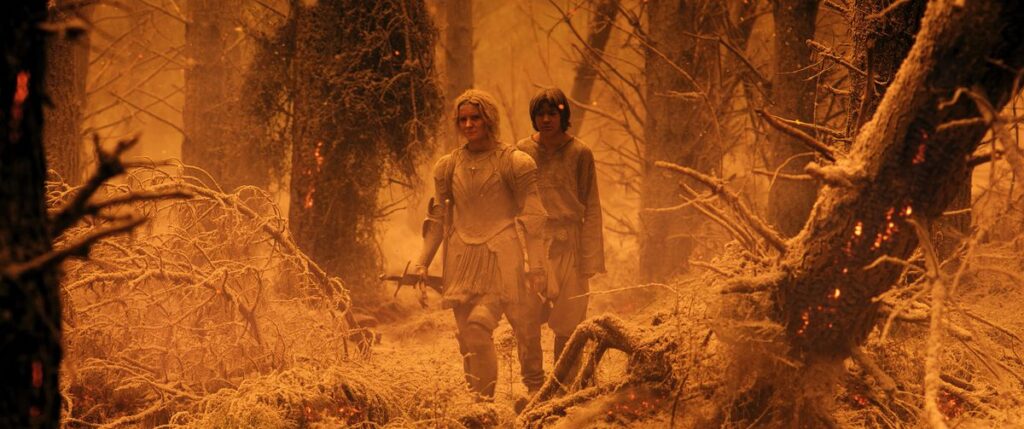With each new episode, The Lord of the Rings: The Rings of Power has put more and more emphasis on the morally ambiguous choices our heroes are forced to make. Episode 6, “Udûn,” presented the explosive fallout from many of these choices, with the first major clash between good and evil culminating in large-scale death and destruction. Sensibly, director Charlotte Brändström and writer Jason Cahill don’t try to top the pyrotechnics of “Udûn” in episode 7, “The Eye,” instead devoting their hour of run time to unpacking the aftermath of everything that’s happened. The result is an action-lite installment that forces Middle-earth’s would-be saviors to weigh up their personal level of responsibility — not just for what has already happened, but for what will happen next, too.
Even those characters who played no direct role in the events of “Udûn” can’t escape Brändström and Cahill’s meditation on obligation and outcome in “The Eye.” Take Durin IV (Owain Arthur), who suffers increasingly severe consequences after refusing to roll back his earlier decision to stand by his brother from an elven mother Elrond (Robert Aramayo). Durin’s reasoning here is morally unassailable — condemning your friend and his entire race to certain death is a decidedly shitty thing to do, after all — yet the episode ends with him bumped from the line of succession, mulling over whether to oust his old man.
It’s an effective bit of plotting by Brändström and Cahill, even if you won’t find anything remotely like it in The Lord of the Rings or its appendices. J.R.R. Tolkien paints a rather more flattering portrait of Durin III (Peter Mullan) in his novels, and what little we know about Durin IV doesn’t include any insurrectionist leanings. But Tolkien also doesn’t explicitly rule out a Battle of the Durins, and the concept ultimately works because it’s grounded in key themes from the books, like friendship and cross-species cooperation. It also gives Mullan a chance to show off his character-acting chops, through moments such as Durin III sharing a memory of his sickly son as a sickly baby that go a long way to developing what risked being a thinly sketched part.
Losing his right to the throne wasn’t the worst knock-on effect of Durin IV’s unsanctioned mithril mining efforts, though. The Rings of Power episode 7 reveals that the dwarven prince’s digging just woke up Durin’s Bane, otherwise known as the balrog from The Fellowship of the Ring. It’s a suitably ominous bit of foreshadowing that also doesn’t quite track with Tolkien’s established canon (Durin’s grandson ended the balrog’s nap in the books) but nonetheless feels justified in an episode so strongly focused on the unforeseen blowback of tough decisions. That Durin IV’s generosity is what unleashes the balrog on his people, and not the greed previously ascribed to his people in other media, only adds to the pathos of the whole affair.
Image: Prime Video
Durin IV’s not alone when it comes to paying a high price for doing the right thing, either; several of our major players are similarly rewarded for their good deeds in The Rings of Power episode 7. Over in the Númenórean camp, Míriel (Cynthia Addai-Robinson) and Elendil (Lloyd Owen) are both grappling with tremendous loss after coming to the Southlanders’ aid in “Udûn.” The former has lost her sight and several of her subjects (#OntamoRIP), while the latter has seemingly lost his son, Isildur (Maxim Baldry). Meanwhile, Galadriel (Morfydd Clark) and Theo (Tyroe Muhafidin) both blame themselves for the Southlands’ devastation and spend most of their red-stained, ash-coated scenes together working through their respective guilt.
Again, this doesn’t exactly jibe with Tolkien’s writings; however, it goes a long way to fleshing out these characters, particularly Míriel and Elendil — adding agency to her arc and internal conflict to his. Admittedly, Míriel’s blindness is a real curveball from a Tolkien reader’s perspective, but as a means of keeping her personally invested in the fight to save Middle-earth, it serves its purpose well enough. Purists will also no doubt struggle with the idea of the poster child for Númenórean virtue that is Elendil consumed with bitterness. However, it fits within the emotional context of The Rings of Power’s narrative. Better still, it leaves him in a more interesting place for season 2 than if he had remained the unwavering paragon of virtue Tolkien described.
What’s more, you can sense the influence of The Rings of Power showrunners J.D. Payne and Patrick McKay at play in storytelling choices like these, which lay the groundwork for future seasons. In particular, the decision to have the Númenórean fleet leave without Isildur (who we all know is still alive) is a smart one, as it will allow Payne and McKay to further build on his characterization once he resurfaces without constantly cutting back to Númenor. Getting to know Isildur better can only be a good thing for the Prime Video series’ remaining four seasons, too, since his is a story as much about tragedy as it is failure. Right now the future king of Gondor is best known for coming up short when Middle-earth was counting on him; the Rings of Power could help us understand why.
And speaking of coming up short, the harfoots are back on the scene in “The Eye” — and if you want to talk about responsibility and consequences, look no further than this narrative strand. The harfoots are on a real reversal-of-fortune roller coaster this episode. One moment, they’re in danger from the Stranger’s (Daniel Weyman) out-of-control magical powers, the next they’re reaping the benefits of his supercharged horticulture, and on it goes. The overall effect of this is that it ties the harfoot plot thread to The Rings of Power’s overarching story in a way that’s happened only very rarely prior to episode 7, which is a welcome change.

Image: Prime Video
Not much of what happens to Nori (Markella Kavenagh) and her nomadic community directly impacts the wider cast of characters, it’s true. But seeing the harfoots come to terms with their responsibility for the Stranger’s well-being — and wind up severely punished for this good deed — is so thematically in tune with the rest of “The Eye,” it makes the narrative gulf between this and other plot threads far less pronounced. It’s not quite enough to compensate for the harfoots’ entire season spent on the wider plot’s fringes, but it certainly doesn’t hurt. Neither does the continued presence of Sauron’s creepy acolytes, whose interest in the Stranger seems destined to forge a more concrete connection between the harfoots’ exploits and the rest of Middle-earth further down the line.
This last bit is yet another example of what “The Eye” does well, aside from its thematic unity: setting out a clear roadmap for where the story is headed next. Sure, this episode’s deliberate pacing falters at times and, as always, the way Lord of the Rings lore is rewritten is bound to raise eyebrows, but what really matters is that The Rings of Power has left the narrative aimlessness of early episodes well and truly behind it.
With one episode left in the first season — and four more seasons supposedly on the way — the board is pretty clear. Durin IV is done following his dad’s orders. Nori and the harfoots are running to the Stranger’s rescue. Galadriel and Theo (as well as Charlie Vickers’ Halbrand) are more committed than ever to Southlands’ cause, even though that part of Middle-earth is officially Mordor now. And Adar (Joseph Mawle) wants to convert Mordor into an orc-safe haven free from persecution by anyone, least of all Sauron (an optimistic plan given even the most casual Tolkien scholar knows where the dark lord ultimately sets up shop).
Is any of this in the books? Not really, no. But as with so many of the deviations from Tolkien’s legendarium in “The Eye,” this is largely a positive reflection on The Rings of Power’s ongoing evolution from an unsure adaptation to a confident story in its own right. As the season 1 finale approaches, it’s genuinely reassuring to know that Payne, McKay, and co. are focused more on their obligation to tell a compelling tale than on slavishly following Lord of the Rings lore to the letter — and damn the consequences.

